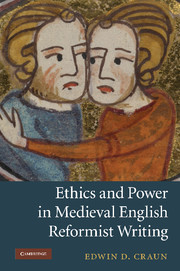Book contents
- Frontmatter
- Contents
- Acknowledgments
- Editorial practices, translations, abbreviations
- Introduction
- 1 Universalizing correction as a moral practice
- 2 Negotiating contrary things
- 3 Managing the rhetoric of reproof: the B-version of Piers Plowman
- 4 John Wyclif: disciplining the English clergy and the Pope
- 5 Wycliffites under oppression: fraternal correction as polemical weapon
- 6 Lancastrian reformist lives: toeing the line while stepping over it
- Postscript
- Notes
- Bibliography
- Index
- CAMBRIDGE STUDIES IN MEDIEVAL LETERATURE
2 - Negotiating contrary things
Published online by Cambridge University Press: 15 April 2010
- Frontmatter
- Contents
- Acknowledgments
- Editorial practices, translations, abbreviations
- Introduction
- 1 Universalizing correction as a moral practice
- 2 Negotiating contrary things
- 3 Managing the rhetoric of reproof: the B-version of Piers Plowman
- 4 John Wyclif: disciplining the English clergy and the Pope
- 5 Wycliffites under oppression: fraternal correction as polemical weapon
- 6 Lancastrian reformist lives: toeing the line while stepping over it
- Postscript
- Notes
- Bibliography
- Index
- CAMBRIDGE STUDIES IN MEDIEVAL LETERATURE
Summary
A fourteenth-century Dominican sermon extant at Magdalen College, Oxford, made up of authoritative statements about fraternal correction by several distinguished members of the order, begins expounding Jesus' precept establishing fraternal correction (“But, if your brother shall offend against you, go and rebuke him”), with the expected firm statements. We are obligated to correct anyone who has injured us. God wills that no one should perish, so He commanded that we correct evildoers, just as He commanded that we forgive the penitent, as a way of leading humans back to Him. So, if anyone has directly injured us or even sinned in our presence, we must honor Christ's imperative. Moreover, we must exercise the greatest patience and care so that they will be reformed, neither flattering nor insulting them, being neither bashful nor brazen. Then the writer of the sermon reconsiders. Is not this command contradicted by another: “But if anyone strikes you on the right cheek, turn to him the other also” (Matthew 5:39)? Therefore, it seems, we should not speak out against those who do evil to us. I respond, the writer continues, that we turn the other cheek if we exercise patience when we rebuke. So, he concludes firmly, rebuke should not be omitted. This same material, with its scholastic structure of question, statement of contradiction, and response, appears almost verbatim in the Franciscan Provincial William of Nottingham's early-fourteenth-century exegesis of the passage.
- Type
- Chapter
- Information
- Ethics and Power in Medieval English Reformist Writing , pp. 35 - 56Publisher: Cambridge University PressPrint publication year: 2010



